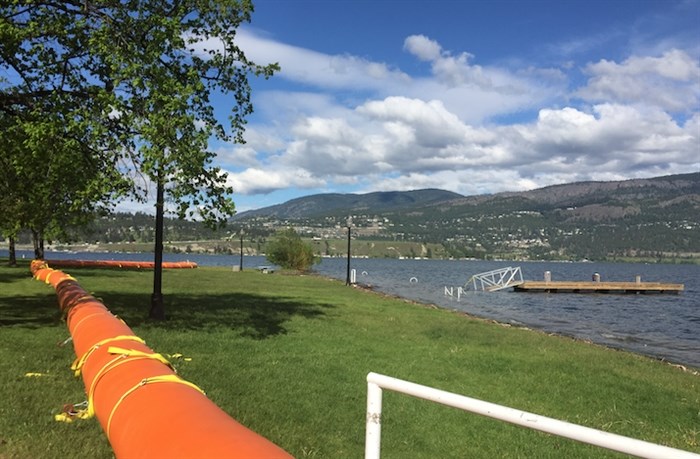
A tiger dam in City Park in Kelowna is pictured in this submitted photo. The province needs to step in and review how Okanagan Lake levels are managed in order to reduce the risk of floods like the one in 2017, according to the Okanagan Basin Water Board.
Image Credit: SUBMITTED/OBWB-OkWaterWise
March 02, 2021 - 3:16 PM
After weeks of collecting letters of support from Okanagan governments, the Okanagan Basin Water Board is sending a letter to the province urging it do an extensive review of Okanagan Lake water levels over the next five years.
“We’re very concerned about the current lake level management and the risks of extreme flooding in the future,” water board executive director Anna Warwick Sears said in a news release. “This is a serious problem we are facing. This is not hype.”
The existing plan for controlling the Okanagan Lake level was put in place in the 1970s and, in the face of climate change, needs updating.
A flood mapping system was created last year and it shows “that the frequency of flooding would be unacceptably high if the Okanagan Dam at Penticton continued to be operated in the same manner, given the expected increase in flows due to climate change,” the release states.
“The technical report for this effort found that as a result of climate change, floods will ‘exceed the capacity of existing infrastructure if operational rules are not adjusted.’”
It also asks that Kalamalka Lake be included in the review because it, too, has flooding problems.
On the other hand, if the lake level is managed just for floods, there could be severe damage in drought years.
“Scientific modelling shows that we are going to experience more precipitation – both rain and snow – but it’s going to be unpredictable,” the release reads. “At the same time, we’re also at heightened risk for drought because of climate change. If we just manage the lake for flooding and draw it down too far, and then have less precipitation than expected in spring and summer, we could create an even greater water shortage.”
That could have significant impacts on farmers, fish and homeowners.
A “gap analysis” is being conducted by the water board to see what further studies are needed, which will be complete in April. It will guide the “comprehensive review” the board wants the province to conduct. It will also require extensive consultation with the public and First Nations.
To contact a reporter for this story, email Rob Munro or call 250-808-0143 or email the editor. You can also submit photos, videos or news tips to the newsroom and be entered to win a monthly prize draw.
We welcome your comments and opinions on our stories but play nice. We won't censor or delete comments unless they contain off-topic statements or links, unnecessary vulgarity, false facts, spam or obviously fake profiles. If you have any concerns about what you see in comments, email the editor in the link above.
News from © iNFOnews, 2021